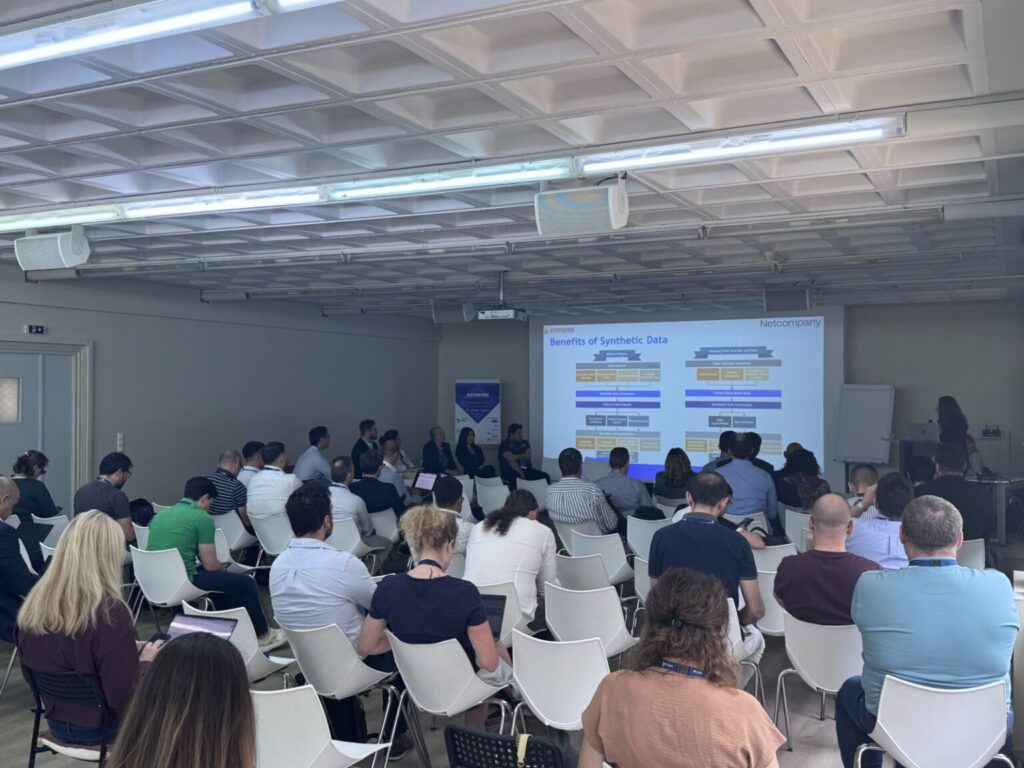Rethinking Synthetic Data for Ethical and Trustworthy AI

AI-DAPT at the Heart of Europe’s Synthetic Data Debate
At Data Week 2025 in Athens, the HELEN Cluster hosted a high-level thematic workshop titled “Synthetic Data: Legal, Ethical, and Technical Implications”, placing the spotlight on one of the most critical and fast-evolving topics in AI.
Bringing together leading experts from across Europe, the workshop explored how synthetic data is reshaping the innovation landscape—and how it challenges existing legal, ethical, and technical frameworks. Among the voices leading this important conversation were Sotiris Koussouris (Suite5) and Marina Cugurra (S&D Consulting), representing the AI-DAPT project.
Technical Perspectives: Responsible Generation of Synthetic Data
In his opening talk, Sotiris Koussouris provided a comprehensive technical overview of synthetic data: how it is generated, when it is useful, and why it matters. Drawing from real-life use cases—from ECG simulation to cybersecurity testing—he emphasized that synthetic data, when designed with care, can offer a privacy-preserving and scalable alternative to sensitive real-world data. He illustrated how generative models such as GANs, VAEs, and diffusion models are enabling progress across sectors. However, he also pointed out unresolved challenges—particularly around realism, evaluation metrics, overfitting, and regulatory ambiguity—that need to be addressed for synthetic data to reach its full potential.
Access to the presentation here.
Ethics & Law: A Call for Responsible Governance
Marina Cugurra offered a deep dive into the legal and ethical implications of synthetic data. Her core message: synthetic does not automatically mean safe. She warned that the boundary between real and synthetic data is often blurred, creating a false sense of privacy protection. Issues such as algorithmic bias, lack of transparency, and the risk of “diversity-washing” require concrete safeguards. Her concluding call was for a harmonised European framework that bridges legal compliance with ethical responsibility, always keeping humans at the centre of AI development.
Access to the presentation here.
Synthetic Data in Action: From Healthcare to Finance
Beyond the technical and legal debates, the workshop featured powerful insights from other EU-funded projects:
- A preview of the BDVA Healthcare Task Force White Paper, presented by Dr. Sofia Tsekeridou (SYNTHEMA), highlighted how synthetic data can support clinical research and AI diagnostics in rare disease contexts, while raising concerns about trust, consent, and interoperability. (presentation here)
- Kostis Mavrogiorgos (University of Piraeus) discussed how synthetic datasets can still replicate biases in public sector applications like digital identity systems—calling for fairness audits and human-in-the-loop strategies. (presentation here)
- Konstantina Tripodi (JRC Capital Management) showcased how synthetic data is strengthening resilience and cybersecurity in the financial sector, helping to simulate fraud and stress-test credit models without exposing sensitive information. (presentation here)
Live Reflections from the Community
An engaging Mentimeter session provided participants the opportunity to share their viewpoints in real time with expert panelists. The discussion featured Argyro Amidi and Alexandros Kalafatelis from Four Dot Infinity, alongside Saurav Baidya from Philips, who also serves as the co-lead of the BDVA TF Healthcare.Some of the key takeaways included:
- Synthetic data must remain GDPR-compliant, even when it mimics personal data.
- Bias can still be embedded or amplified through synthetic generation.
- There’s an urgent need for transparent evaluation frameworks.
- SMEs and academia are currently more open to experimentation than large public institutions.
Looking Ahead: AI-DAPT’s Commitment to Trustworthy AI
The HELEN Workshop marked an important moment in the evolving European discourse on AI and synthetic data. For AI-DAPT, the active participation of Sotiris Koussouris and Marina Cugurra demonstrated the project’s commitment to fostering human-centered, privacy-conscious, and legally sound approaches to data-driven innovation.
As emerged from the discussion, synthetic data is not just a technological solution—it’s a governance choice, a design responsibility, and a societal challenge. And AI-DAPT is proud to be part of shaping this conversation for the future of trustworthy AI in Europe.
